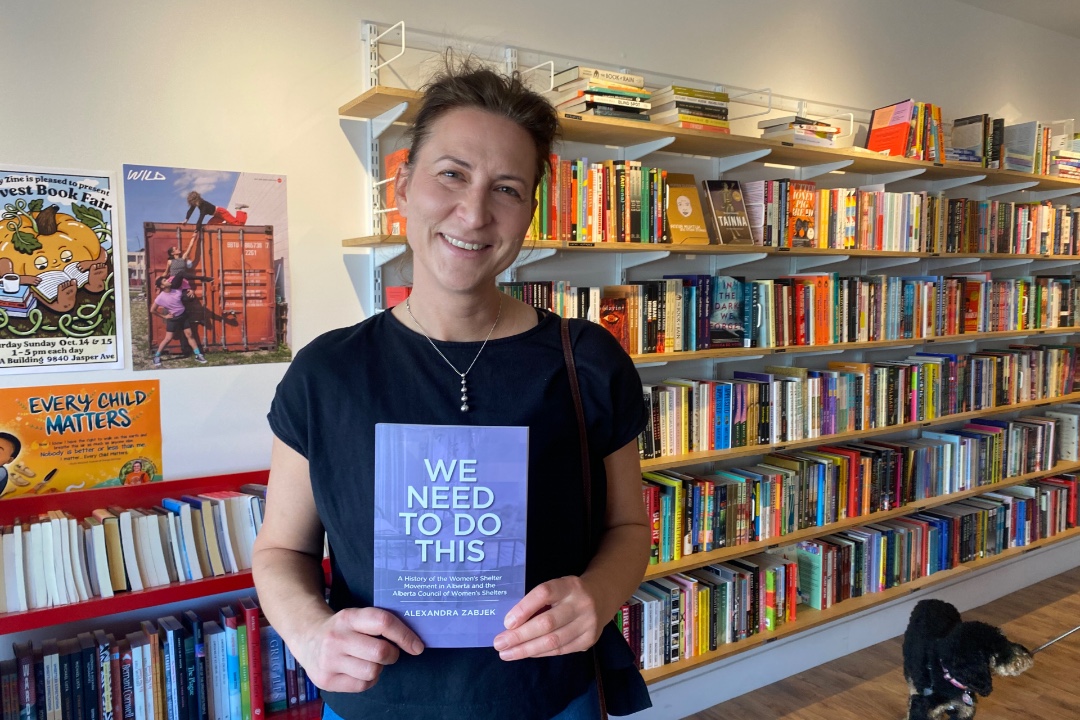The Alberta Council of Women's Shelters has published a book that shares the previously untold stories of those who created refuges for women and children escaping abuse.
We Need to Do This: A History of the Women's Shelter Movement in Alberta and the Alberta Council of Women's Shelters is available now and will be officially launched at LitFest on Oct. 21. The event will feature a discussion with the book's author, Alexandra Zabjek.
"First of all, I just hope that this book offers recognition and insight into the efforts of women who have shaped this province for the better," Zabjek told Taproot.
The ACWS commissioned the book to give voice to a relatively unknown part of Alberta's past: the development of women's shelters as they evolved into an official social service.
"That's an important part of Alberta history and Alberta women's history," said Zabjek.
ACWS executive director Jan Reimer had been discussing the idea of collecting these stories with colleagues for more than a decade. The age of some sources meant that these stories had to be told now or never.
"If we don't get their stories and they die, their stories will never be told, and it'll be lost history," Reimer said in an interview. "So, we thought it was really important to hear their voices because they're the voices that often aren't heard or are not heeded."

Alexandra Zabjek will speak about her book, We Need to Do This, at a LitFest event on Oct. 21 at the Stanley A. Milner Library. (Supplied)
More than unearthing history, Reimer also wanted to shine a light on the kinds of services that those early efforts led to.
"The services that women's shelters offer is more than a bed," she said. "It's an amazing array of services that they provide to the community — both to women who are living with violence, to their families, but also in terms of prevention programs that they conduct. So, there's a whole range of programming, and that too, I think, is not well understood."
Putting all of these pieces together meant organizing accounts from the 1960s and '70s up to the present. Although Zabjek had many years of experience as a journalist under her belt, working on a project of this length and breadth was a new experience.
"I think that it would be fair to say that I was so impressed and had so much respect for the efforts of women over so many years to do what they knew was right to help women in need, and in many cases, these were very grassroots efforts of women who were getting together," she said.
The stories in this book are an important part of our history, but Zabjek hopes readers won't see these challenges as mere relics from the past.
"I hope that people recognize that domestic violence against women has been an issue in our society for a long time and remains an issue," she said, noting her experience as a journalist covering the court beat. "I became far too familiar with how these stories play out in court, and it's still happening, and we need to recognize that this continues to be a problem in our society."
Zabjek's book launch is one of several events taking place during LitFest, Canada's oldest nonfiction literary festival, which started on Oct. 12 and runs until Oct. 22. A mix of free and paid events are still to come:
- Oct. 18, 12pm: Midi littéraire, online and in French with author Martine Delvaux;
- Oct. 18, 7:30pm: Nonfiction Story Slam, an open mic storytelling competition hosted by Alison Hagan at 99Ten;
- Oct. 19, 12pm: LitFest at Lunch: Myrna Kostash at the Sage Seniors Association;
- Oct. 19, 6pm: Featured Author: Vivek Shraya; hosted by Chris Chang-Yen Phillips at the Stanley A. Milner Library's Muttart Theatre;
- Oct. 20, 12pm: CLC Brown Bag Lunch with Trina Moyles and Omar Mouallem at the University of Alberta's Henderson Hall;
- Oct. 20, 7pm: Featured Author: Jen Sookfong Lee, hosted by Makda Mulatu at the Stanley A. Milner Library's Muttart Theatre;
- Oct. 20, 8:15pm: SUPERQUIZ!, hosted by comedy and quiz writers Gordie Lucius and Joey Lucius at the Stanley A. Milner Library's Muttart Theatre;
- Oct. 21, 12pm: Masterclass: How to Write Trauma Without Traumatizing Your Reader, hosted by Thom Ernst at the Stanley A. Milner Library's Community Room;
- Oct. 21, 2pm: Featured Author: John Brady McDonald, hosted by Kyra Lee Brown at the Stanley A. Milner Library's Muttart Theatre;
- Oct. 21, 7pm: Memoir Hour — The Art of Memoir, hosted by Sarah Chan with panelists Jen Sookfong Lee, Thom Ernst, and Jeannie Marshall at the Stanley A. Milner Library's Muttart Theatre;
- Oct. 22, 11am: A Brunch of Writers: On Community, hosted by Casey Plett with a panel of authors and a performance of a community-created braided poem at The Westin Edmonton;
- Oct. 22, 3pm: Masterclass: Entering the Room — The Privacy of Nonfiction, with Casey Plett at the Stanley A. Milner Library's Community Room.
